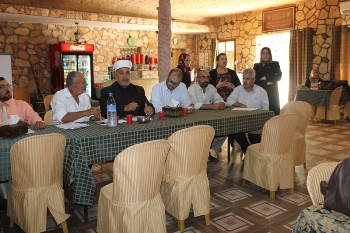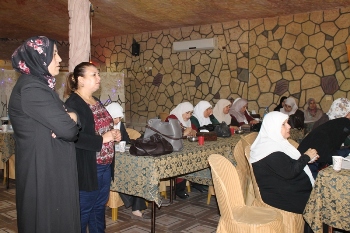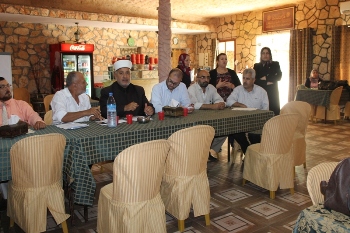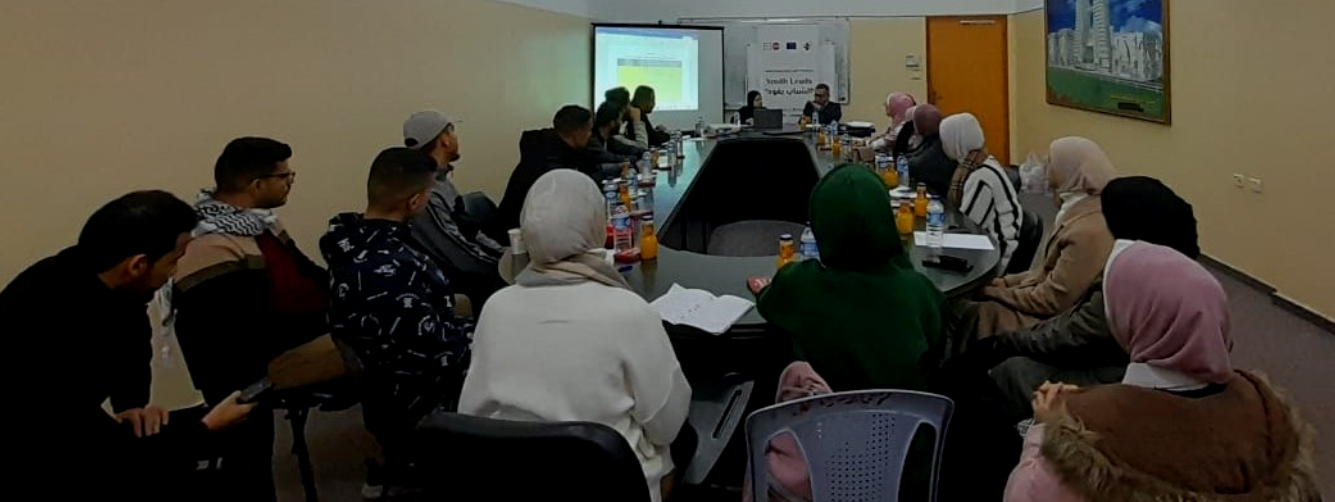
Ramallah – Participants in an evaluation session for training workshops that were organized by the Directorate General of Women at the Ministry of Waqf and Religious Affairs in close coordination with MIFTAH recommended the need to enact laws that stymie domestic violence. They also called for publishing guidelines for reproductive health in coordination with various institutions such as schools. They reaffirmed the need for female [Muslim] preachers and imams to be involved in more training workshops and for materials on this subject to be available in universities. The workshops are part of MIFTAH's Support for the Protection of Women's Project in partnership with UNFPA.
The workshop evaluated the performance of the preachers and imams after they held awareness sessions in their communities in the Tulkarm and Jenin districts. Based on feedback from the participants, MIFTAH, in cooperation with the Waqf Ministry, decided it would hold 92 additional sessions with the preachers and imams throughout November, 2015.
The workshops addressed mechanisms of communication and outreach in promoting awareness on issues of reproductive health and combatting violence against women. There were 35 participants in total, including12 imams and 23 female preachers. The meetings were the outcome of training while execution on the ground was through close follow-up by the Waqf and trainers.
The floor was given to Myassar Nubani, Director General of Women in the Waqf ministry in Nablus, who said the training workshops left an important impact on the participants in terms of shifting preconceptions. “It will also promote dialogue, whether in the family or society,” she said.
Sheikh Khamis Abdeh, deputy Waqf minister spoke about the importance of holding these workshops on reproductive health and gender-based violence. He also stressed on the important role of NGOs in implementing projects and programs related to these topics such as PAL, TAM and MIFTAH in order to increase awareness in local communities in particular.
The female preachers and imams conveyed several of their experiences during the workshops, reiterating the need for more training and workshops for clergymen and preachers, since religion is an important point of access in society and has a considerable impact in shifting many issues and concepts pertaining to women.
Essential changes
The imams and preachers who participated in the awareness workshops talked about the essential changes these workshops elicited. They said they no longer addressed people and society on issues of religion and worship alone because the workshops opened their eyes to other issues that touch people’s lives and which do not contradict with religion and sharia law.
Enriched culture and information
Imam and Friday sermon preacher Mohammed Wajih Ziyoud said the workshops had an impact on his culture and information and rectified some inherited concepts and beliefs. “No doubt I benefited from this,” he said. “I now apply what I learned in my house and my surroundings, whether through private sessions or my behavior in my home. It had a huge impact on my life.”
Breaking out of the box
Amal Odeh, in charge of the women’s department in Tulkarm, said the most important part of the training was the targeted beneficiaries, that is, preachers and imams. “I felt they were thirsty for and receptive to speaking about these subjects, even if they had only focused on religious affairs before and would shy away from subjects such as reproductive health,” she said. However, after the training, things changed. “They were more enthusiastic about addressing these issues.”
Involvement in reproductive health issues
Focus was also put on the need to integrate men in reproductive health issues through raising their awareness on issues of reproductive health and rights and gender-based violence. Some imams shared success stories during the training program with targeted sectors, pointing to the need for training subjects that address emerging social issues.
The evaluation session showed a discrepancy in attitudes of the targeted sector on the subject of reproductive health whereby some considered it positive while others expressed reservations even though there was an overall conviction of the need for it.
Obstacles
In speaking about the obstacles, some of the organizers found difficulty in coordination between the organizations, especially educational institutions. This indicates the lack of awareness within the government establishment on the process of documentation. Furthermore, some participants showed reservations about the topics at hand.










